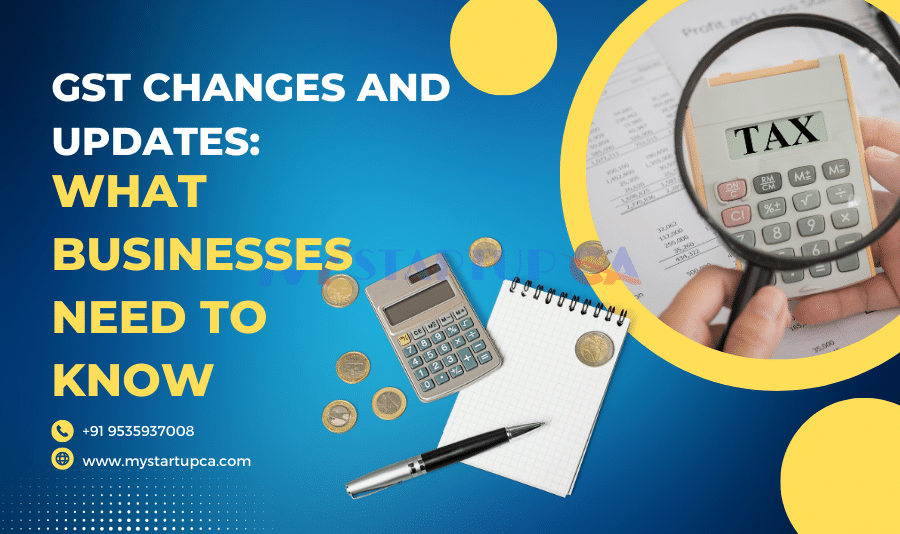
Stay informed about the latest GST changes and updates that impact businesses. From e-invoicing mandates to rate revisions and QR code requirements on e-way bills, understand the implications for your operations and ensure compliance with expert insights and proactive strategies.
MyStartupCA
Goods and Services Tax (GST) is a dynamic tax regime that undergoes periodic changes and updates to streamline processes, enhance compliance, and address emerging challenges. Staying informed about these changes is crucial for businesses to ensure compliance and adapt their operations accordingly. In this guide, we'll discuss recent GST changes and updates that businesses need to know.
Overview of Recent GST Changes
1. E-invoicing Mandate
Change: The government has introduced mandatory e-invoicing for businesses with a turnover exceeding INR 50 crores. E-invoicing aims to improve invoice reporting accuracy, reduce tax evasion, and streamline compliance.
Impact: Affected businesses need to implement e-invoicing systems and ensure compliance with the prescribed invoice format and reporting requirements. Non-compliance can result in penalties and disruptions to business operations.
2. Quarterly Return Filing for Small Taxpayers
Change: Small taxpayers with an annual turnover of up to INR 5 crores can now opt for quarterly filing of GST returns (Form GSTR-3B and GSTR-1). This initiative aims to ease compliance burden and promote ease of doing business.
Impact: Eligible businesses can benefit from reduced compliance frequency and administrative overhead. However, it's essential to ensure accurate reporting and timely filing to avoid penalties.
3. Changes in GST Rates
Change: The government periodically revises GST rates for various goods and services based on economic factors and policy objectives. Recent changes have included rate reductions for essential goods and revisions in rates for specific sectors.
Impact: Businesses need to stay updated on changes in GST rates to adjust pricing strategies, update accounting systems, and ensure compliance with revised tax liabilities.
4. Introduction of QR Code on E-way Bills
Change: The government has mandated the inclusion of a Quick Response (QR) code on e-way bills generated for the movement of goods. The QR code provides detailed information about the consignment and enhances transparency in transit.
Impact: Businesses involved in the movement of goods need to ensure compliance with the QR code requirement and incorporate the necessary technology infrastructure to generate compliant e-way bills.
What Businesses Need to Know
Stay Informed
It's crucial for businesses to stay informed about GST changes and updates through official channels such as the GST portal, notifications from the GST Council, and updates from professional advisors. Regularly monitor changes in GST rates, compliance requirements, and procedural updates that may impact your business operations.
Evaluate Impact
Assess the impact of GST changes on your business operations, pricing strategies, compliance obligations, and financial projections. Conduct a thorough review of your systems, processes, and documentation to ensure alignment with the updated GST regulations and requirements.
Update Systems and Processes
Implement necessary changes to your accounting systems, invoicing processes, and compliance procedures to incorporate new GST requirements. Invest in technology solutions, training programs, and resources to facilitate seamless transition and ensure compliance with updated regulations.
Review Contracts and Agreements
Review existing contracts, agreements, and business arrangements to identify any clauses or provisions that may be affected by recent GST changes. Make necessary amendments or renegotiate terms to ensure compliance and mitigate any potential risks or liabilities.
Seek Professional Advice
Engage with professional advisors, such as chartered accountants, tax consultants, and legal experts, to seek guidance on navigating GST changes and updates. Leverage their expertise to assess the impact on your business, address compliance challenges, and optimize tax planning strategies.
Staying abreast of GST changes and updates is essential for businesses to maintain compliance, minimize risks, and seize opportunities in the evolving tax landscape. By staying informed, evaluating the impact, updating systems and processes, reviewing contracts, and seeking professional advice, businesses can effectively navigate GST changes and ensure smooth operations in the dynamic business environment. Embrace change as an opportunity to enhance efficiency, streamline compliance, and drive business growth in the GST era.

